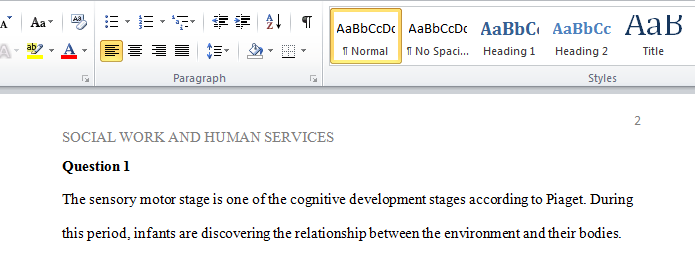Answer the following questions on Social Work and Human Services
In Chapter 3, we traced the development of sensory, perceptual, and motor processes during infancy. How do those descriptions compare with Piaget’s view of the sensorimotor period?
b. Do the developmental mechanisms in the information-processing perspective emphasize nature, nurture, or both?
c. What roles might classical conditioning, operant conditioning, and imitation have in creating emotional bonds between infants and their parents?
d. Vygotsky emphasized cognitive development as collaboration. How could such collaboration be included in Piaget’s theory? In information processing?
e. Compare Piaget’s theory, Vygotsky’s theory, and the information-processing approach in their emphasis on the role of language in cognitive development.
f. Based on Jean Piaget’s description of infancy (page 94), what cognitive skills might be important prerequisites for the formation of an attachment relationship?
g. How might an infant’s ability to express emotions relate to the formation of attachment? How might this ability relate to the temperamental characteristics described on pages 67–68?
h. Why must a full account of children’s prosocial behavior include an emphasis on skills (e.g., empathy), as well as one on situations (e.g., whether a child feels responsible)?
i. How might Piaget have explained the emergence of make- believe during the preschool years? How would Erikson explain it?
j. How would different theories of cognitive development described in chapter 4 explain the gender-related differences in cognitive skills described on page 143?
Answer preview for Answer the following questions on Social Work and Human Services
Words: 364

